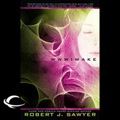
 Flashforward
Flashforward
By Robert J. Sawyer; Read by Mark Deakins
10.5 Hours – [UNABRIDGED]
Publisher: Blackstone Audio
Published: 2009
A scientific experiment begins, and as the button is pressed, the unexpected occurs: everyone in the world goes to sleep for a few moments while everyone’s consciousness is catapulted more than twenty years into the future. At the end of those moments, when the world reawakens, all human life is transformed by foreknowledge.
Was that shocking revelation a peek at the real, unalterable future, or was it only one of many possible futures? What happens when a man tries to change it, like the doctor who has twenty years to try to prevent his own murder? How will the foreknowledge of a part of “then” affect the experience of the “now”?
A great book! And it’s going to be a TV series this fall on ABC:
 Nightmare at 20,000 Feet
Nightmare at 20,000 FeetBy Robert J. Sawyer; Read by Various
10.5 Hours – [UNABRIDGED]
Publisher: Blackstone Audio
Published: 2009
One of the finest and most influential horror writers of the twentieth century, Richard Matheson (I Am Legend, The Incredible Shrinking Man, Somewhere in Time) has left his stamp on the collective imagination. Here are more than twenty of Matheson’s most memorable tales of fear and paranoia, personally selected by the author himself. Many of these stories have already entered into popular culture, including the title story, which became a landmark episode of The Twilight Zone, and “Duel”, the nail-biting tale of man versus machines that inspired Steven Spielberg’s first film.
Other stories include “First Anniversary,” “Dress of White Silk,” “Witch War,” “Dance of the Dead,” “Mad House,” “Prey,” “Blood Son,” “Crickets,” “Wet Straw,” “The Children of Noah,” “Through Channels,” “Old Haunts,” “Disappearing Act,” “The Holiday Man,” “Legion of Plotters,” “The Distributor,” “Long Distance Call,” “Slaughter House,” and “The Likeness of Julie.” Find out why Stephen King (who writes the introduction) has called Matheson one of his favorite writers.
And here is part of the famous Twilight Zone episode based on the cover story:
 The Invisible Man
The Invisible ManBy H. G. Wells; Read by James Adams
5.5 Hours – [UNABRIDGED]
Publisher: Blackstone Audio
Published: 2009
On a freezing February day, a stranger emerges from out of the gray to request a room at a local provincial inn. Who is this out-of-season traveler? More confounding is the thick mask of bandages obscuring his face. Why does he disguise himself in this manner and keep himself hidden away in his room?
Aroused by trepidation and curiosity, the local villagers bring it upon themselves to find the answers. What they discover is a man trapped in a terror of his own creation, and a chilling reflection of the unsolvable mysteries of their own souls.
And here’s the trailer for The Invisible Man (1933) starring Claude Rains:
Posted by Scott D. Danielson





 WWW: Wake
WWW: Wake